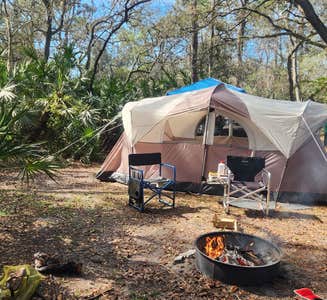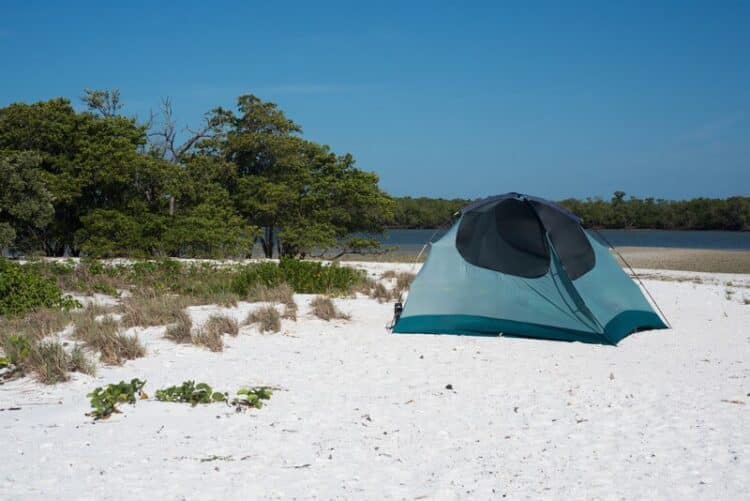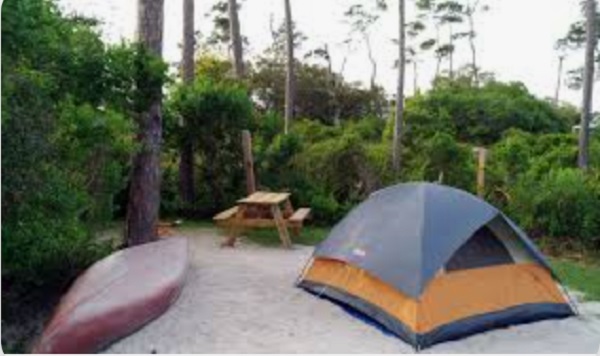Are you thinking about tent camping in Florida but wondering if it’s truly safe? You’re not alone.
Whether you’re a first-timer or a seasoned camper, knowing what to expect can make all the difference. From unpredictable weather to local wildlife, there are important things you need to consider before pitching your tent. Keep reading, and you’ll discover key tips and facts that can help you enjoy your Florida camping trip with confidence and peace of mind.
Florida Camping Risks
Tent camping in Florida can be a fun outdoor activity. Still, it comes with some risks. Knowing these risks helps you stay safe.
Florida’s environment is unique. It has many animals, weather changes, and uneven land. These factors can affect your camping trip.
Wildlife Encounters
Florida has many wild animals. Some can be dangerous if surprised or provoked. You might see snakes, alligators, or insects near your campsite.
Always keep food stored safely. Avoid feeding or touching wildlife. Watch where you step and sleep to avoid bites or stings.
- Snakes like rattlesnakes and water moccasins live in the wild
- Alligators are found near lakes and rivers
- Mosquitoes can carry diseases and are common at dusk
- Spiders and ticks may hide in tall grass or woodpiles
Weather Challenges
Florida’s weather changes quickly. Sudden rainstorms and high heat can make camping hard. Lightning is also a serious danger during storms.
Be ready for hot days and cool nights. Check weather reports before your trip. Bring rain gear and sun protection to stay comfortable and safe.
- Afternoon thunderstorms are common in summer
- Heat and humidity can cause dehydration
- Strong winds may knock down tents or trees
- Lightning strikes can happen during storms
Terrain Hazards
Florida’s land varies from sandy beaches to swamps. Uneven ground and wet areas can cause slips and falls. Some places have sharp plants or hidden holes.
Choose your campsite carefully. Avoid setting up near water or on steep slopes. Wear sturdy shoes and watch your steps when hiking or walking around camp.
- Sandy areas may be unstable for tents
- Swamps and marshes have soft, wet ground
- Roots and rocks can cause tripping
- Sharp plants like saw palmetto can scratch skin

Credit: blog.whiteduckoutdoors.com
Choosing Safe Campsites
Camping in Florida can be fun and relaxing. Picking a safe spot to set up your tent is very important. It helps keep you safe from nature and insects.
Before you start camping, think about the place you choose. Look for a site that protects you from water, floods, and bugs.
Proximity To Water
Being close to water is nice for drinking and swimming. But camping too close can be risky. Water can rise quickly during rain.
Pick a campsite at least 200 feet away from lakes, rivers, or the ocean. This keeps you safe from sudden water changes and bugs near water.
Avoiding Flood Zones
Florida has areas that flood easily. Camping in these spots can be dangerous when it rains. Check maps or signs to find flood zones.
Choose higher ground for your tent. Avoid low areas where water can pool. This helps keep your gear dry and safe.
- Look for flat, dry land above flood level
- Check local flood maps before camping
- Stay away from riverbanks and low valleys
Checking For Insect Activity
Insects like mosquitoes and ticks live in Florida. They can spread diseases or cause bites. Check the area for insect signs before setting up.
Look for standing water and tall grass. These places have more bugs. Clear your campsite and use insect repellent to stay safe.
- Avoid areas with many mosquitoes or bugs
- Clear leaves and grass from your tent area
- Use insect spray and wear long sleeves
Essential Gear For Safety
Tent camping in Florida can be fun but also challenging. It is important to bring the right gear to stay safe.
Good preparation helps you enjoy nature without worry. This guide covers essential safety gear for camping.
Proper Tent Selection
Choose a tent that can handle Florida’s weather. Look for waterproof and wind-resistant materials.
A tent with good ventilation helps keep bugs out and reduces heat inside. Pick one that fits your group size.
- Waterproof rainfly for heavy rain
- Strong poles for wind
- Mesh windows for airflow and bug protection
- Easy to set up and take down
First Aid Kit Must-haves
Bring a first aid kit with supplies for common injuries. Florida’s environment may cause cuts, bites, or stings.
Keep your kit stocked with basics. Check it before every trip to make sure nothing is expired or missing.
- Bandages and adhesive tape
- Antiseptic wipes and cream
- Insect bite relief cream
- Pain relievers like ibuprofen
- Tweezers and scissors
- Allergy medicine if needed
Bug Protection Tools
Florida has many insects that can bother campers. Use tools to protect yourself from bites and stings.
Choose bug sprays and nets to reduce insect contact. Keep your tent closed and use repellents on skin and clothes.
- Insect repellent spray with DEET or picaridin
- Bug netting for tents and hammocks
- Wear long sleeves and pants at dawn and dusk
- Use citronella candles or coils around camp

Credit: thedyrt.com
Weather Preparedness
Tent camping in Florida means dealing with unique weather challenges. It is important to prepare for heat, storms, and temperature changes.
Knowing how to handle these conditions will help keep you safe and comfortable during your trip.
Dealing With Heat And Humidity
Florida is hot and humid most of the year. This can cause dehydration and heat sickness if you are not careful.
Wear light clothes, drink plenty of water, and rest often in the shade or inside your tent if it is cooler.
- Use a fan or battery-powered air circulator inside the tent
- Set up your tent under trees to get natural shade
- Avoid heavy meals and caffeine during the heat
Storm And Lightning Safety
Florida storms can come quickly and bring strong winds, rain, and lightning. Always watch the weather forecast.
If you hear thunder or see lightning, stay inside the tent and avoid tall trees or metal objects.
- Keep a weather radio or phone app to get alerts
- Find lower ground away from water and open fields
- Wait at least 30 minutes after the last thunder before going outside
Nighttime Temperature Drops
Even in warm Florida, nights can get cooler, especially in winter months. Be ready for temperature changes.
Bring extra blankets or a sleeping bag rated for lower temperatures to stay warm and sleep well.
- Layer your clothing to adjust to changing temperatures
- Use a tent with good ventilation to avoid dampness
- Keep dry clothes inside the tent for night use
Wildlife Safety Tips
Tent camping in Florida means sharing space with many animals. Some wildlife can be dangerous. Knowing how to stay safe helps you enjoy camping.
Use these safety tips to protect yourself from insects, alligators, and other animals. Staying alert keeps your trip fun and safe.
Handling Insect Bites
Florida has many insects that can bite or sting. Mosquitoes and ticks are common near water and woods. Protect your skin and clothes.
If you get bitten, clean the area with soap and water. Use ice to reduce swelling. Avoid scratching to stop infection.
- Wear long sleeves and pants in the evening
- Use insect repellent with DEET or picaridin
- Check your body for ticks after hiking
- Keep your tent zipped to keep bugs out
Avoiding Alligator Areas
Alligators live in many Florida lakes, rivers, and swamps. They can be dangerous if you get too close. Stay away from water edges.
Do not swim or wade in areas with alligator signs. Keep pets and children away from water. Watch for alligators during dawn and dusk.
- Camp at least 50 feet from water bodies
- Do not feed or approach alligators
- Stay alert near water, especially at night
- Follow park rules about wildlife safety
Keeping Food Secure
Wild animals are attracted to food smells. Leaving food out can bring bears, raccoons, and other critters to your campsite.
Store food in sealed containers or coolers. Keep food away from your tent. Dispose of trash properly in animal-proof bins.
- Use airtight containers to stop odors
- Hang food bags from a tree branch if needed
- Clean cooking areas after use
- Do not leave scraps or leftovers outside
Health Precautions
Tent camping in Florida can be fun but needs careful health planning. The warm climate and nature bring specific risks.
Taking health precautions helps you stay safe and enjoy your camping trip. Know how to handle heat, allergies, and hydration.
Hydration Strategies
Florida’s heat can make you lose water fast. Drinking enough water keeps your body working well during camping.
Carry enough water and drink often, even if you do not feel thirsty. Avoid sugary drinks and alcohol as they cause dehydration.
- Bring at least one gallon of water per person each day
- Drink small amounts regularly throughout the day
- Use a water bottle with a filter if using natural water sources
Preventing Heatstroke
Heatstroke is a serious risk in Florida’s hot weather. It happens when your body gets too hot and cannot cool down.
Wear light, loose clothing and rest in shade often. Avoid heavy activity during the hottest hours of the day.
- Wear a wide-brimmed hat to protect your head
- Use sunscreen to avoid sunburn
- Take breaks in shaded or cool spots
- Know signs of heatstroke: dizziness, headache, nausea
Managing Allergies
Florida has many plants and insects that can cause allergies. Prepare to avoid reactions and treat symptoms quickly.
Bring allergy medicine and avoid touching plants or insects you do not know. Keep your tent closed to stop bugs from entering.
- Use insect repellent to prevent bites
- Wear long sleeves and pants in wooded areas
- Check for ticks and remove them carefully
- Carry antihistamines or allergy inhalers if needed
Campfire And Cooking Safety
Tent camping in Florida is fun but requires care with campfires and cooking. Fire safety keeps you and nature safe.
Knowing safe fire and food practices helps prevent accidents and wildfires while camping.
Safe Fire Practices
Always build campfires in designated fire rings or pits. Keep fires small and manageable.
Never leave a fire unattended. Have water or a shovel nearby to put out the fire quickly.
- Clear dry leaves and branches around fire area
- Do not burn trash or plastics
- Extinguish fire fully before sleeping or leaving
Food Storage Guidelines
Store food in sealed containers to avoid attracting wildlife. Keep food away from your tent.
Use bear-proof lockers if available. Dispose of trash properly to keep animals away.
- Keep raw and cooked food separate
- Clean cooking utensils after use
- Store food in coolers or sealed bags
Preventing Wildfires
Florida can be dry, so wildfires spread fast. Only light fires where allowed and follow local rules.
Check fire danger levels before camping. Avoid fires on windy days or during dry seasons.
- Use a shovel and water to fully put out fires
- Do not discard cigarette butts on the ground
- Report any uncontrolled fires to authorities immediately
Emergency Preparedness
Tent camping in Florida can be fun but also risky. Being ready for emergencies keeps you safe.
Knowing what to do in an emergency helps protect you and your group.
Knowing Nearest Help
Find the closest hospital or clinic before you camp. Know the location of park rangers or emergency services.
Keep a list of important phone numbers with you. This helps you get help quickly if needed.
- Nearest hospital or urgent care center
- Park ranger station location
- Local police and fire department contacts
- Emergency medical services (EMS) phone numbers
Communication Tools
Carry a fully charged mobile phone with extra batteries or power banks. Phones help you call for help fast.
A two-way radio is useful where phone signals are weak. It helps you stay in touch with your group or rescue teams.
- Mobile phone with extra battery
- Power bank or portable charger
- Two-way radios or walkie-talkies
- Whistle to signal for help
Evacuation Plans
Plan how to leave the campsite safely if there is a storm or fire. Know all exit routes from the area.
Share the plan with everyone in your group. Decide on a meeting point outside the camp.
- Identify at least two exit routes
- Choose a safe meeting spot outside the camp
- Practice evacuation drills with your group
- Keep a packed emergency bag ready

Credit: www.floridarambler.com
Frequently Asked Questions
Is Tent Camping In Florida Safe?
Tent camping in Florida is generally safe with proper precautions. Be aware of local wildlife like alligators and snakes. Check weather forecasts for storms or hurricanes. Choose designated campsites with security measures. Always follow park rules and guidelines to ensure a safe camping experience.
What Should I Know About Florida Wildlife?
Florida is home to diverse wildlife, including alligators, snakes, and insects. Stay alert and respect wildlife habitats. Keep food securely stored to avoid attracting animals. Use insect repellent to prevent bites. Understanding local wildlife helps ensure a safe and enjoyable camping experience.
How Can I Prepare For Florida Weather?
Florida’s weather can be unpredictable. Check forecasts before your trip. Prepare for rain, heat, and humidity. Pack waterproof gear and sun protection. Stay hydrated and avoid camping during hurricane season. Being prepared helps you enjoy your camping experience while staying safe.
Are There Any Specific Camping Regulations In Florida?
Florida has specific camping regulations to ensure safety and preserve nature. Camp only in designated areas. Follow fire restrictions and waste disposal guidelines. Obtain necessary permits if required. Respect quiet hours and other park rules. Adhering to regulations enhances safety and protects the environment.
Conclusion
Tent camping in Florida offers a unique outdoor experience. Nature is beautiful but can be unpredictable. Stay aware of weather changes and local wildlife. Choose well-maintained campsites for added safety. Keep your gear dry and secure at all times. Simple safety steps make camping enjoyable and worry-free.
Enjoy the fresh air and peaceful nights under the stars. Camping in Florida can be safe and fun with care. Ready for your next adventure?

